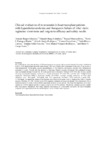Mostrar o rexistro simple do ítem
Clinical evaluation of rosuvastatin in heart transplant patients with hypercholesterolemia and therapeutic failure of other statin regimens: short-term and long-term efficacy and safety results
| dc.contributor.author | Barge-Caballero, Gonzalo | |
| dc.contributor.author | Barge-Caballero, Eduardo | |
| dc.contributor.author | Marzoa Rivas, Raquel | |
| dc.contributor.author | Paniagua-Martín, María J. | |
| dc.contributor.author | Barrio-Rodríguez, Alfredo | |
| dc.contributor.author | Naya, Carmen | |
| dc.contributor.author | Blanco-Canosa, Paula | |
| dc.contributor.author | Grille Cancela, Zulaika | |
| dc.contributor.author | Vázquez Rodríguez, José Manuel | |
| dc.contributor.author | Crespo-Leiro, María Generosa | |
| dc.date.accessioned | 2017-06-15T07:39:21Z | |
| dc.date.available | 2017-06-15T07:39:21Z | |
| dc.date.issued | 2015-04-23 | |
| dc.identifier.citation | Barge-Caballero G, Barge-Caballero E, Marzoa-Rivas R, et al. Clinical evaluation of rosuvastatin in heart transplant patients with hypercholesterolemia and therapeutic failure of other statin regimens: short-term and long-term efficacy and safety results. Transpl Int. 2015;28(9):1034-1041 | es_ES |
| dc.identifier.issn | 1432-2277 | |
| dc.identifier.uri | http://hdl.handle.net/2183/19174 | |
| dc.description.abstract | [Abstract] We conducted an observational study of 30 heart transplant recipients with serum low-density lipoprotein cholesterol (LDL-c) >100 mg/dl despite previous statin therapy, who were treated with rosuvastatin 10 mg daily (5 mg in case of renal dysfunction). Serum lipids, creatine phosphokinase (CPK), bilirubin, and hepatic enzymes were prospectively measured 2, 4, and 12 weeks after the initiation of the drug. Clinical outcomes of patients who continued on long-term rosuvastatin therapy beyond this 12-week period were reviewed in February 2015. Over the 12-week period following rosuvastatin initiation, serum levels of total cholesterol (TC) and LDL-c and the ratio TC/high-density lipoprotein cholesterol (HDL-c) decreased steadily (P < 0.001). Average absolute reductions of these three parameters were –48.7 mg/dl, –46.6 mg/dl, and –0.9, respectively. Seventeen (57%) achieved a serum LDL-c < 100 mg/dl. No significant changes from baseline were observed in serum levels of triglycerides, HDL-c, hepatic enzymes, bilirubin, or CPK. Twenty-seven (90%) patients continued on long-term therapy with rosuvastatin over a median period of 3.6 years, with no further significant variation in lipid profile. The drug was suspended due to liver toxicity in 1 (3.3%) patient and due to muscle toxicity in 2 (6.7%) patients. All adverse reactions resolved rapidly after rosuvastatin withdrawal. Our study supports rosuvastatin as a reasonable alternative for heart transplant recipients with hypercholesterolemia and therapeutic failure of other statin regimens. | es_ES |
| dc.language.iso | eng | es_ES |
| dc.publisher | Wiley | es_ES |
| dc.relation.uri | http://dx.doi.org/10.1111/tri.12585 | es_ES |
| dc.rights | This is the peer reviewed version of the article which has been published in final form at Wiley Online Library. This article may be used for non-commercial purposes in accordance with Wiley Terms and Conditions for self-archiving. | es_ES |
| dc.subject | Heart transplantation | es_ES |
| dc.subject | Hypercholesterolemia | es_ES |
| dc.subject | Rosuvastatin | es_ES |
| dc.title | Clinical evaluation of rosuvastatin in heart transplant patients with hypercholesterolemia and therapeutic failure of other statin regimens: short-term and long-term efficacy and safety results | es_ES |
| dc.type | info:eu-repo/semantics/article | es_ES |
| dc.rights.access | info:eu-repo/semantics/openAccess | es_ES |
| UDC.journalTitle | Transplant International | es_ES |
| UDC.volume | 28 | es_ES |
| UDC.issue | 9 | es_ES |
| UDC.startPage | 1034 | es_ES |
| UDC.endPage | 1041 | es_ES |
Ficheiros no ítem
Este ítem aparece na(s) seguinte(s) colección(s)
-
INIBIC-ICATC - Artigos [178]






